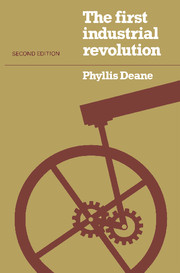Book contents
- Frontmatter
- Contents
- Preface to the first edition
- Preface to the second edition
- 1 The starting-point
- 2 The demographic revolution
- 3 The agricultural revolution
- 4 The commercial revolution
- 5 The transport revolution
- 6 The cotton industry
- 7 The iron industry
- 8 The sources of innovation
- 9 The role of labour
- 10 The role of capital
- 11 The role of the banks
- 12 The adoption of free trade
- 13 The role of government
- 14 Economic growth and economic cycles
- 15 Standards of living
- 16 The achievement
- Guide to further reading
- Subject index
- Index of authors cited
- Frontmatter
- Contents
- Preface to the first edition
- Preface to the second edition
- 1 The starting-point
- 2 The demographic revolution
- 3 The agricultural revolution
- 4 The commercial revolution
- 5 The transport revolution
- 6 The cotton industry
- 7 The iron industry
- 8 The sources of innovation
- 9 The role of labour
- 10 The role of capital
- 11 The role of the banks
- 12 The adoption of free trade
- 13 The role of government
- 14 Economic growth and economic cycles
- 15 Standards of living
- 16 The achievement
- Guide to further reading
- Subject index
- Index of authors cited
Summary
By 1851, the year of the great Crystal Palace Exhibition, Britain had clearly passed the point of no return in the process of industrialization. This much was obvious to contemporaries and has been accepted since by economic historians, though the latter interpret it in different ways. According to Clapham, ‘the course was set towards the “industry state” but the voyage was not half over’. According to the Rostow ‘stages of growth’ model this was approximately the date at which Britain reached ‘maturity’, and had, by definition,
mastered and extended over virtually the whole range of its resources all that the then modern science and technology had to offer an economy with the resources and the population-resource balance of mid-nineteenth century Britain … Less then seventy years from the launching of the canal and cotton textile boom of the 1780's when the industrial revolution may be said to have begun, Britain had wholeheartedly transformed itself into an industrial nation—its commitment confirmed by the Repeal of the Corn Laws.
It is generally agreed, then, that Britain had been through an industrial revolution by the middle of the nineteenth century, though the revolution had by no means worked itself out. What did this imply? What were the significant changes that had taken place in the economy since the middle of the nineteenth century? How far had it got on the route to today's modern industrial economy?
- Type
- Chapter
- Information
- The First Industrial Revolution , pp. 272 - 295Publisher: Cambridge University PressPrint publication year: 1980



